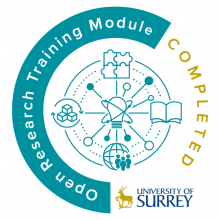
Emma Henderson
About
Biography
I completed my BA in Classical Civilisation at the University of Leeds, and my MSc in Psychology at Kingston University. Prior to completing my MSc I spend over a decade in industry working in product and business development within the fashion industry.
I am a member of the Registered Reports Steering Committee, an Ambassador for the Centre for Open Science (COS), and part of the Preregistration Support Community. You can find slides for talks I have given on the OSF here.
University roles and responsibilities
- Open Research Working Group
News
In the media
ResearchResearch interests
I investigate how people might use non-probative cues, such as repetition and concreteness of language, to make truth judgements in the absence of any probative information or knowledge. I focus on the replicability of these truth effects with a view to understanding the robustness of the literature, and the implications of their real-world application.
Open Research Statement
My goal is to conduct and promote rigorous, transparent science ethically throughout my career. I write and publish confirmatory research as Registered Reports. I use the Open Science Framework (OSF) to share materials, data, scripts and lab logs. I prioritise submitting papers to open access journals that select based on scientific validity rather than subjective impact. I am passionate about contributing to meta-psychology projects with the potential to improve research culture or practices.
Research interests
I investigate how people might use non-probative cues, such as repetition and concreteness of language, to make truth judgements in the absence of any probative information or knowledge. I focus on the replicability of these truth effects with a view to understanding the robustness of the literature, and the implications of their real-world application.
Open Research Statement
My goal is to conduct and promote rigorous, transparent science ethically throughout my career. I write and publish confirmatory research as Registered Reports. I use the Open Science Framework (OSF) to share materials, data, scripts and lab logs. I prioritise submitting papers to open access journals that select based on scientific validity rather than subjective impact. I am passionate about contributing to meta-psychology projects with the potential to improve research culture or practices.
Publications
When you lack the facts, how do you decide what is true and what is not? In the absence of knowledge, we sometimes rely on non-probative information. For example, participants judge concretely worded trivia items as more likely to be true than abstractly worded ones (the linguistic truth effect; Hansen & Wänke, 2010). If minor language differences affect truth judgements, ultimately they could influence more consequential political, legal, health, and interpersonal choices. This Registered Report includes two high-powered replication attempts of Experiment 1 from Hansen and Wänke (2010). Experiment 1a was a dual-site, in-person replication of the linguistic concreteness effect in the original paper-and-pencil format (n = 253, n = 246 in analyses). Experiment 1b replicated the study with an online sample (n = 237,n = 220 in analyses). In Experiment 1a, the effect of concreteness on judgements of truth (Cohen’s dz = 0.08; 95% CI: [–0.03, 0.18]) was smaller than that of the original study. Similarly, in Experiment 1b the effect (Cohen’s dz = 0.11; 95% CI [–0.01, 0.22]) was smaller than that of the original study. Collectively, the pattern of results is inconsistent with that of the original study.
Academic careers are becoming less linear and secure, and are increasingly shaped by environmental constraints. As a result, highly qualified early and mid-career researchers, in particular from STEM (Science, Technology, Engineering, and Mathematics) disciplines, are pursuing careers outside academia. This paper advances theory and empirical research on career transitions and sustainable careers by investigating how junior academics transition into the field of data science by exploring the facilitators of their career transition and the ways in which they experience career sustainability in their new occupational field. This study relies on 28 in-depth interviews with early and mid-career STEM researchers from elite universities who decided to join a data science “bootcamp” to pursue a new career as data scientists. Our study reveals the career barriers that junior researchers experience in academia and how career catalysts increase their career adaptability, facilitating a career transition into sustainable careers in data science. Our study shows that career sustainability is experienced through the reaffirmation of interviewees' identity as researchers outside of academia as well as in the reconciliation between their previous career expectations and actual career outcomes after transitioning into data science.
Repeated statements are rated as subjectively truer than comparable new statements, even though repetition alone provides no new, probative information (the illusory truth effect). Contrary to some theoretical predictions, the illusory truth effect seems to be similar in magnitude for repetitions occurring after minutes or weeks. This Registered Report describes a longitudinal investigation of the illusory truth effect (n = 608, n = 567 analysed) in which we systematically manipulated intersession interval (immediately, one day, one week, and one month) in order to test whether the illusory truth effect is immune to time. Both our hypotheses were supported: We observed an illusory truth effect at all four intervals (overall effect: χ2(1) = 169.91; Mrepeated = 4.52, Mnew = 4.14; H1), with the effect diminishing as delay increased (H2). False information repeated over short timescales might have a greater effect on truth judgements than repetitions over longer timescales. Researchers should consider the implications of the choice of intersession interval when designing future illusory truth effect research.
Planning is an everyday activity that is extended in time and space, yet is frequently studied in the absence of interactivity. Successful planning relies on an array of executive functions including self-control. We investigated the effects of interactivity and self-control on planning using a sequential-task paradigm. Half of the participants first completed a video-viewing task requiring self-control of visual attention, whereas the other half completed the same task without the selfcontrol constraint. Next, and within each of these groups, half of the participants manipulated cards to complete their plan (high-interactivity condition); for the other half, plans were made with their hands down (lowinteractivity condition). Planning performance was significantly better in the high- than in the lowinteractivity conditions; however the self-control manipulation had no impact on planning performance. An exploration of individual differences revealed that long-term planning ability and non-planning impulsiveness moderated the impact of interactivity on planning. These findings suggest that interactivity augments working memory resources and planning performance, underscoring the importance of an interactive perspective on planning research.
People believe information more if they have encountered it before, a finding known as the illusory truth effect. But what is the evidence for the generality and pervasiveness of the illusory truth effect? Our preregistered systematic map describes the existing knowledge base and objectively assesses the quality, completeness and interpretability of the evidence provided by empirical studies in the literature. A systematic search of 16 bibliographic and grey literature databases identified 93 reports with a total of 181 eligible studies. All studies were conducted at Western universities, and most used convenience samples. Most studies used verbatim repetition of trivia statements in a single testing session with a minimal delay between exposure and test. The exposure tasks, filler tasks and truth measures varied substantially across studies, with no standardisation of materials or procedures. Many reports lacked transparency, both in terms of open science practices and reporting of descriptive statistics and exclusions. Systematic mapping resulted in a searchable database of illusory truth effect studies (https://osf.io/37xma/). Key limitations of the current literature include the need for greater diversity of materials as stimuli (e.g., political or health contents), more participants from non-Western countries, studies examining effects of multiple repetitions and longer intersession intervals, and closer examination of the dependency of effects on the choice of exposure task and truth measure. These gaps could be investigated using carefully designed multi-lab studies. With a lack of external replications, preregistrations, data and code, verifying replicability and robustness is only possible for a small number of studies.
The last decade has seen renewed concern within the scientific community over the reproducibility and transparency of research findings. This paper outlines the various responsibilities of stakeholders in addressing the systemic issues that contribute to this concern. In particular, this paper asserts that a united, joined up approach is needed, in which all stakeholders, including researchers, universities, funders, publishers, and the UKRI, work together to set standards of research integrity and engender scientific progress and innovation. In the spirit of coordinated action, our team represents individual researchers, predominantly from the field of Psychology, who each share a self-declared interest in meta-science and reproducibility. We come from a range of UK universities, and we bring expertise from a breadth of specialisms, meta-science interests, roles, and career stages. We, therefore, represent a core group within the community of individuals, institutions, and structures that we discuss.
Open scholarship has transformed research, introducing a host of new terms in the lexicon of researchers. The Framework of Open and Reproducible Research Teaching (FORRT) community presents a crowd-sourced glossary of open scholarship terms to facilitate education and effective communication between experts and newcomers.
The last decade has seen renewed concern within the scientific community over the reproducibility and transparency of research findings. This paper outlines some of the various responsibilities of stakeholders in addressing the systemic issues that contribute to this concern. In particular, this paper asserts that a united, joined-up approach is needed, in which all stakeholders, including researchers, universities, funders, publishers, and governments, work together to set standards of research integrity and engender scientific progress and innovation. Using two developments as examples: the adoption of Registered Reports as a discrete initiative, and the use of open data as an ongoing norm change, we discuss the importance of collaboration across stakeholders.
As researchers, we use academic writing to present our results to other academics and to a wider audience. In doing so, we may be tempted to use persuasive communication devices for promoting our research. These devices may be at risk of misleading readers and reviewers when assessing our research. In this document, we identify a list of such communication devices. A precursor of this list was originally shared on Twitter by Olivier Corneille who received comments and additional examples collected in the list below. We discussed and clustered them as a result of reflections made on our own writing style, as well as observations made in research articles by other authors.
The items are organized along a tentative typology that may be reconsidered at a later stage. We focus on writing styles that apply to the presentation and interpretation of research findings, including data visualization, but excluding issues related to methods and statistical analyses.
Our intention with this document is to encourage self-reflection amongst authors (contributing researchers) as well as reviewers and editors on the use and potential misuse of persuasive communication devices in written scholarly reports, so that we as a global scholarly community can uphold highest possible standards to research rigor.
When you preregister (or create a pre-analysis plan) you specify your research plan and publicly register it in advance of undertaking your study. The preregistration is a time-stamped, read-only plan. When this plan is extended and undergoes formal peer review at a journal ahead of the research, it is called a Registered Report. This preprint explains why and how to write a preregistration or Registered Report, along with information on the types of work this applies to, whether preregistration and Registered Reports “work”, and a list of resources and templates.
